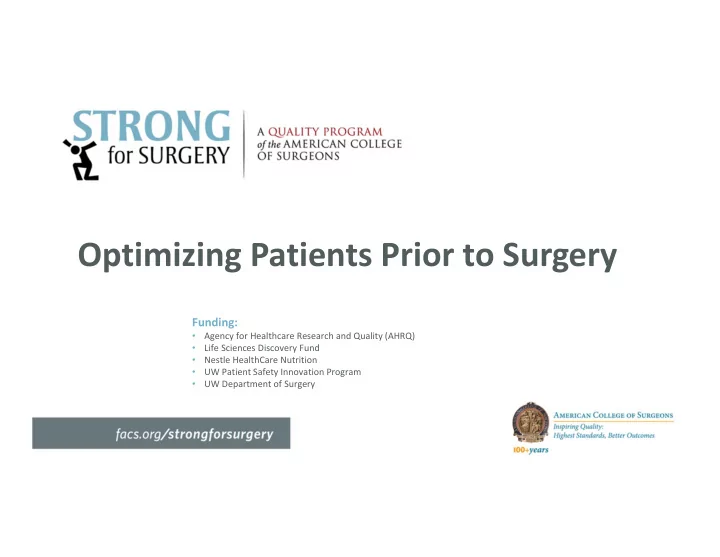

Optimizing Patients Prior to Surgery Funding: • Agency for Healthcare Research and Quality (AHRQ) • Life Sciences Discovery Fund Nestle HealthCare Nutrition • • UW Patient Safety Innovation Program • UW Department of Surgery
Objectives of Strong for Surgery Offer resources to hospitals and clinics to help them optimize patient health Presurgery checklists for surgical patients • in four target areas • Implementation support to standardize best practices in clinical practice Drive improvements to make surgery safer by getting research results back into health care practice to facilitate system change
Focus on Four Modified Areas Nutrition Blood Sugar • Screening for malnutrition • Screening for risk of diabetes • Testing albumin levels for risk stratification • Screening for blood sugar • Evaluating for immunonutrition • Monitoring perioperative glucose management Medications Smoking • Screening to identify • Identification of drugs that smoking habits and history could cause bleeding and cardiac risks • Advising patient on how to • Reconciling herbal medications establish a quit plan
Why Nutrition? SCOAP: Albumin and Complications • Malnutrition prevalent in surgical patients Elective Colon/Rectal Procedures 2011 • Best determinant of surgical outcome • Modifiable with appropriate intervention • Immunonutrition may improve recovery
Why Smoking? • Surgical site infections are Never Smoker more prevalent for smokers Prior Smoker Current Smoker • Quitting smoking before 1.6 surgery decreases risk of 1.4 adverse events 1.2 1 0.8 • Wound healing is faster for 0.6 nonsmokers 0.4 0.2 • The presurgery visit is an 0 opportunity to discuss the benefits of quitting for life All Patients Neurosurgery Orthopedic
Why Blood Sugar? Hyperglycemia doubles the risk of SSI • In some studies 47% of hyperglycemic episodes were in nondiabetics! Of the adult population over 65 years: • 1 in 4 will have diabetes • 2 in 4 are prediabetic In a study of patients from 2005 ‐ 2008 (U.S. adults over 20 years), 35% had prediabetes
Why Medications? Some medications and herbal remedies increase risk of bleeding • Echinacea, Garlic, Ginkgo, Ginseng, Kava, Saw Palmetto, St. John’s Wort, Valerian ↑ risk • Aspirin can be safely continued Beta ‐ blocker continuation, however, is associated with fewer cardiac events and mortality
The Checklist • Checklists help standardize presurgical evaluation and provide opportunities for appropriate interventions • Screening questions are designed to compliment existing patient presurgical assessments and QI initiatives
Program Implementation Hospital/Clinic Expectations: Strong for Surgery: • Change team formation • Preassessment and support champion • Workflow mapping • Commitment through • Assessment of resource needs post ‐ implementation • Feedback—clinicians and staff • Checklist adoption • Post ‐ assessment • Data abstraction and sharing • Stakeholder call attendance • Feedback for improvement
Pilot Year – 2012
Current Impact
For more information Visit the website: facs.org/strongforsurgery • Read the evidence • View our checklists E ‐ mail us: strongforsurgery@facs.org Social media: StrongforSurgery @Strong4Surgery
Recommend
More recommend